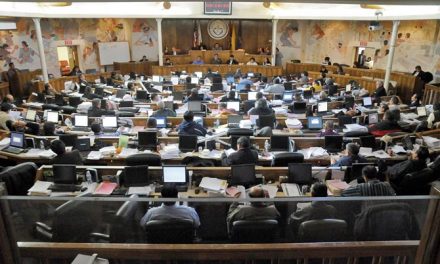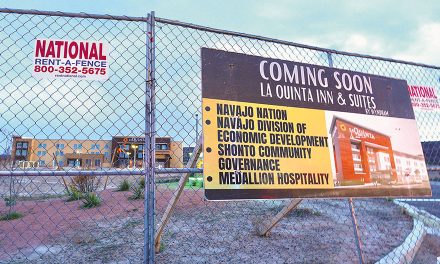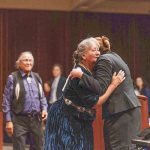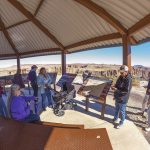
Central Navajo Agency Council meeting addresses election, governance, tribal budget
By Rick Abasta
Navajo Housing Authority
ROUGH ROCK, Ariz.
The Central Navajo Agency Council convened at Rough Rock Community School Sept. 28.
The council had five resolutions on the agenda for consideration, including supporting the candidacy of Jonathan Nez for Arizona’s 2nd Congressional District, recommending and supporting Chinle Comprehensive Health Care Facility participation in a research study, adopting a position by the agency council that the state of Arizona must provide the Navajo Nation with resources to facilitate the transition to a post-coal economy, support for Oliver Tapaha’s University Council for Educational Administration’s Voices from the Filed 5 research project, and support for designation of the Little Colorado River, Colorado River, and Little Colorado River Gorge and other sites as sacred sites.
With the passage of the resolutions, the council listened to reports, beginning with the president’s office. The Navajo Housing Authority also provided a report on housing projects addressing burnout units, vacant units, and waste disposal for housing developments in Chinle Agency.
Reports, making laws
Harrison Tsosie, the executive director for the Navajo Government Development Office, provided a report on conducting research, analysis and making proposals for governmental changes that are necessary to ensure an accountable and responsible government to the Navajo people.
His presentation primarily focused on the development of the Diyin Nihookáá’ Dine’é Bee Haz’áanii Bitsi Siléí and the history of the Title 2 amendments in 1989, which changed the tribal government from a two branch government to the temporary three branch government of today.
The turmoil of 1989 and former chairman Peter MacDonald Sr.’s futile effort to retain power resulted in government reform and temporary government, he said, including the creation of the Navajo Government Development Office.
“We’re not talking about band-aids and putting it on what we have now,” he said. “We’re talking about redoing the whole government because the government is here to serve you, not themselves.”
Tsosie asked the audience if they knew that Navajo people arose from the Four Worlds that existed before today that the Holy Earth Dwelling People now reside upon.
“That’s the foundation of what sits before us today,” he said.
The Navajo Government Development Department is working on other alternative forms, which is known as the government reform project, he said.
Tsosie said there are three ways of making laws today: the 164 Review Process (representative democracy), referendum (direct democracy), and initiative process.
Examples of the initiative process include the 88 to 24 Council reduction and legislation that enacted the presidential line-item veto authority.
“The threshold for the initiative process is too high,” he said. “We’re working on removing that and lowering the threshold to seven percent of people that voted in the last election.”
The initiative could then get added to the ballot and Navajo votes would have to vote and get 50 percent of the vote plus one for the initiative to pass.
“Will the Navajo Nation Council empower the Navajo people to do that?” he asked, adding that it’s akin to the “throw the bums out” mentality.
Disqualified candidates, ‘11th-hour’
Nicole Reske of the Chinle Navajo Board of Elections Supervisors reported next about the Navajo Nation Chapter Elections and said 192 candidates were disqualified.
Ninety-nine of those candidates filed a grievance and the issue affected the printing of the ballot, she explained. The Navajo Nation ballot is usually a lengthy process anyway because of the photos that are included on the ballot.
“The Navajo Nation is the only one with a unique ballot because we include photos, which is why election staff need that extra time to prepare,” she said. “We are trying to decide whether or not to hold off on the election because of these issues.”
JoAnn Dedman, the Nazlini Chapter secretary, said efforts to push through the election “at the 11th hour” don’t sit well with her, especially since the disqualified candidates are accused of malfeasance and breaking the law.
“We’re being put into the same category as these criminals,” she said. “The board shouldn’t proceed with these ballots.”
Chinle Agency Council Chairman Joseph Dedman assigned a chair pro tem to allow for time to speak on the issue.
“They’re watching us. The Ethics and Rules Office is supposed to educate us on the rule changes, but the Council and the election office said that it’s not up to us,” he said. “I think they already had their mind made up before they even ruled.”
Dedman said he was speaking on behalf of the 192 people that were disqualified.
“They don’t have the money to fight this,” he said, adding that k’é needs to be observed because the Navajo Fundamental Law wasn’t observed in this process.
Lukachukai Chapter President Paula Begay expressed empathy for the disqualified candidates and said it’s the responsibility of the candidates and leaders not to overlook these candidates.
Reske reported that campaign expenses are always a hard ask from candidates and that sometimes, the documents are not submitted until six to eight years later.
“When a new law like this comes into place it causes a big chaos,” she said, adding that it’s only her second year working for the Chinle NBOES.
“Accountability, that’s what we’re looking at. The rule change has been made public as well,” she said.
Nygren’s line-item veto
Vikki Shirley, a staff assistant in the Office of the President and Vice President, provided the president’s report after a brief introduction by Patrick Sandoval, the president’s chief of staff.
She mentioned the Chinle Fair Fun Run for “Wellness Warriors” that was sponsored by the OPVP and said she worked with Bessie Yellowhair-Simpson, the Central Agency Fair coordinator.
Shirley introduced Arbin Mitchell, the Division of Community Development executive director, to provide the update on the continuing resolution and President Nygren’s line-item veto.
Mitchell went through a timeline of events, including the budget allocation, the three branch chiefs agreement, and the July 16 attorney general legal opinion that was issued.
“We met on this three times and president issued a proclamation to get the budget done quickly to prevent complications,” he said. “He approved this continuing resolution.”
Allen expressed her disappointment with the continuing resolution and said it’s not the same as a continuing resolution from the federal government.
“For the U.S. government, a continuing resolution is until December, but this one isn’t like that, it’s until March,” she said. “It’s almost like a new budget.”
Mae-Gilene Begay, the Forest Lake Chapter president, asked for transparency from the president’s office regarding the president’s travel, including other elected officials like Chief Justice JoAnn Jayne.
“Please have the chief justice work with the Executive Branch and Legislative Branch so we can move forward with a new budget instead of dealing with a continuing resolution,” she said.
Working on a budget
Council Delegate Carl R. Slater said the Council would start work again on the budget if the president promised not to sue the tribal council. Sandoval interjected at this point and said no.
“We had to stop the budget because of the legal opinion of the attorney general,” Slater said. “There was not talking things out, the president just sicced the AG on us.”
He said the Council wants to pass the budget but they’re in a Catch-22 predicament. Dedman spoke again and pleaded with the leaders to work together.
“I wish you could come together and solve this issue for thousands of Navajo people. Can you come together and work?” she asked.
Speaker Crystalyne Curley spoke next and began by saying she started her political career as an elected official for the Rough Rock School Board.
“Where’s the president?” she asked. “Why isn’t he here to speak to us? They’re just blaming me, yet he hasn’t spoken to me. No words on how we are going to fix this issue.”
Curley said she visits all the chapters so the people “could hear it from the horse’s mouth.”
“Where does the president really stand with the budget?” she asked.
Parrish spoke next and said the BFC took a hard look at the Comprehensive Navajo Nation Budget and identified departments and divisions paying for the president’s travel even though he already had his travel budget.
She said everything was outlined in the budget instruction manual, including a calendar, public hearing schedule, and chapter deadlines.
“We need to do a produce a comprehensive budget, not just what’s produced by our leaders in Window Rock because there’s a lack of direct services to the people across the Navajo Nation,” she said.
Return to kinship
Council Delegate Brenda Jesus spoke about the RDC oversight for Navajo chapters.
“People at the community level are telling us that chapters are not helping us with funding,” she said. “We report before you about our work.”
Jesus said the Council hears reports about restraining orders being issued at chapters and called for a return to kinship and advocated for government reform through amending the tribal code.
She spoke of the more than 500 abandoned uranium sites across the Navajo Nation and said the health issues of the Navajo families impacted by uranium are a concern for the Council delegates that traveled to Washington, D.C. recently to advocate for reauthorization of the Radiation Exposure Compensation Act.
“Some people are barely living, and others are dead. This is major work for us,” she said.
Jesus touched on other issues being addressed by the RDC, including telecommunications, homesite leases, forestry, the Navajo Agricultural Products Industry, and the Navajo Hopi Partitioned Lands.
“There’s a lot of concerns that people share with us and we’re also working on these,” she said.
After receiving reports from the remaining tribal divisions and NHA, the agency council adjourned around 4:30 p.m.








 Highway 264,
Highway 264, I-40, WB @ Winslow
I-40, WB @ Winslow